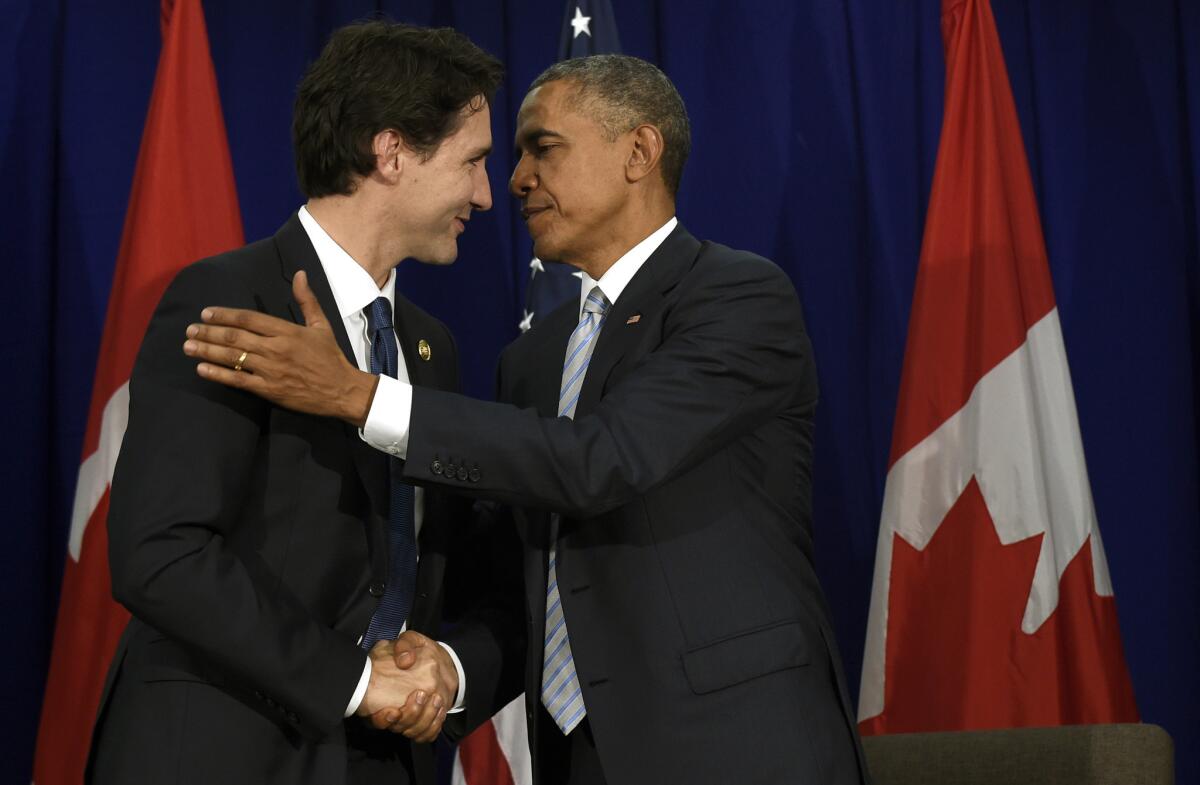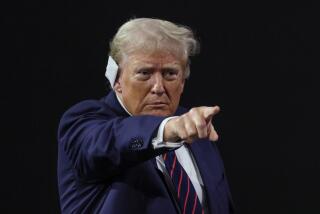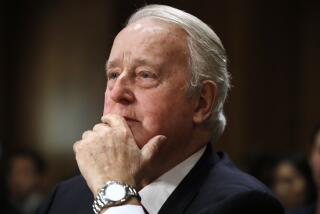Canada’s Justin Trudeau replaces Obama as young, charismatic leader on world stage

Canadian Prime Minister Justin Trudeau and President Obama shake hands following their bilateral meeting at the Asia-Pacific Economic Cooperation summit in Manila on Thursday.
Reporting from Manila — The contrast was inescapable. At the top of a local newspaper’s front page here was a huge photo of the new Canadian prime minister, in a trim suit and wind blowing through his hair, captioned “ladies’ choice.” Next to him was a workmanlike headline over a separate story: “Obama to give PH two warships.”
President Obama, once a glamorous figure among world leaders, has been replaced as the “It Boy” of the summit circuit by Canada’s newly elected Justin Trudeau, as heads of state meet up this week in Turkey, the Philippines and Malaysia.
Though Obama came to Manila for the Asia-Pacific Economic Cooperation summit with a new financial commitment to bolster the Philippine maritime fleet, the nation’s hearts and minds seemed won over by the 43-year-old Canadian, who lighted up Twitter with the designation #APECHottie.
NEWSLETTER: Get the day’s top headlines from Times Editor Davan Maharaj >>
If there was any resentment on the part of a president whose hair is more salt than pepper these days, it didn’t show as he and Trudeau sat down here for their first official meeting.
Obama warned him: “If you don’t want to gray like me, you need to start dyeing it soon.”
“So young and yet so cynical,” Trudeau joked in response.
Though Trudeau’s global image as a hip, next-generation leader mirrors Obama’s of seven years ago, Trudeau’s views on some of Obama’s biggest policy priorities provide a more sobering contrast.
Trudeau has been ambivalent on the massive Pacific trade deal Obama is pushing, and he reiterated to Obama on Thursday that he planned to follow through on his campaign pledge to end Canada’s part in the air campaign against Islamic State -- though his nation will ramp up efforts to train local fighters in Iraq and Syria.
“Canada continues to be a strong player, doing its part – and more than its part,” Trudeau said.
Differences in viewpoint between two North American leaders is familiar. Canadian leaders have long tried to show independence from the United States in matters of foreign policy. Trudeau’s father, Prime Minister Pierre Trudeau, was one of the first Western leaders to embrace communist China and grew so close to Fidel Castro that the Cuban leader served as an honorary pallbearer at his funeral.
“Canada and the U.S. have not always seen eye-to-eye when there’s a Liberal government in power, something that stems from Trudeau’s own party and parentage,” said Antonia Maioni, a political science professor at McGill University in Montreal who researches and writes about the Canadian political process and social policy. “It stems from the Canadian attitude that emerged under Pierre Trudeau that was about Canada finding its own way in international relations and not just being part of the U.S. orbit.”
But in the budding relationship between Obama and the younger Trudeau, there may be potential for collaboration, given the youth-oriented campaign that Trudeau ran – Obama noted the similarity to his own “hope and change” message – and their shared affinity for progressive social policies, especially on climate change.
Given that common ground, said Maioni, Trudeau may eventually drift more closely toward Obama’s point of view on national security and trade, too.
“A lot of people in Trudeau’s inner circle were inspired by and have taken advice from people around Obama,” she said. “That may open a conversation that would allow for change.”
Obama and Trudeau on Thursday began to explore an area in which they may be able make progress together – the fight against climate change.
Obama’s recent announcement to reject a Canadian company’s request to build the controversial Keystone XL pipeline that would have carried crude oil from Alberta to U.S. Gulf Coast refineries was fortunate for Trudeau, said James Coleman, a legal scholar at the University of Calgary who studies environmental and energy regulation. Even though Trudeau was in favor of the pipeline, he is helped by the timing of the debate over it, which came during the tenure of his predecessor, the Conservative Party’s Stephen Harper.
“Given that President Obama was going to reject the pipeline, sooner was better for him,” said Coleman. “Because now it will be easier for him to pin it on Harper.”
Added Coleman: “It’s not hard to predict a little more friendliness between Obama and Trudeau than there was between Obama and Harper.”
Trudeau, whose graduate studies were in environmental science, emphasized the similarities in his and Obama’s climate doctrines. He noted that Canadians feel that their government hasn’t done enough to protect the environment, and he vowed to set and meet tough targets for carbon reduction.
Obama echoed the sentiment, arguing that transition from fossil fuels “does not happen overnight,” especially by nations that produce and consume a lot of oil and gas. Seated next to Trudeau, the father of three young children, Obama also made an argument about parenthood.
“If we want to preserve this planet for our kids and grandkids, then we’re going to have to shift increasingly away from carbon-emitting energy sources,” Obama said.
“This is going to be a messy, bumpy process worldwide,” he said, “but I am confident that we can get it done.”
Memoli reported from Manila and Parsons from Washington.
For more White House coverage, follow @mikememoli and @cparsons
ALSO
Why fewer Mexicans are leaving their homeland for the U.S.
House votes to block Syrian refugees, ignoring White House veto threat
Islamic State presence in the U.S. ‘the new normal,’ FBI director says
More to Read
Get the L.A. Times Politics newsletter
Deeply reported insights into legislation, politics and policy from Sacramento, Washington and beyond. In your inbox three times per week.
You may occasionally receive promotional content from the Los Angeles Times.












